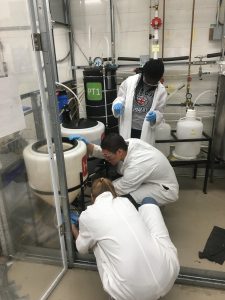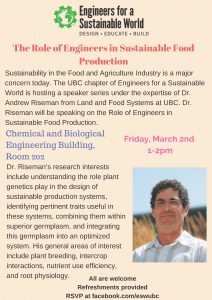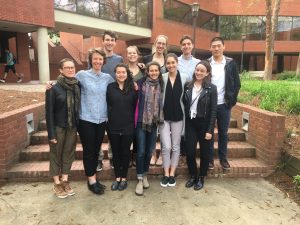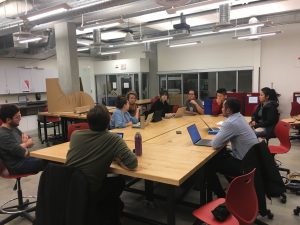2018 was another year of learning and growth for members of the University of British Columbia’s chapter of Engineers for a Sustainable World (ESW). ESW is a mission driven organization with the goals to unite networks and empower engineers to tackle sustainability challenges.
The year began with monthly general meetings discussing topics such as sustainable consumption and plastics use, sustainable urban systems, and progress on Vancouver’s 2020 Greenest City Action Plan. Progress was also made on ESW’s biodiesel project. With funding assistance from a Shell Experiential Learning Fund (SELF) grant, ESW members were able to replace the oil filtration system for the pilot-scale biodiesel production lab housed in the Chemical and Biological Engineering building. Replacing the filtration system was a major step forward in allowing ESW members to demonstrate production of renewable biodiesel from used cooking oil collected from campus dining halls.

ESW students working on replacing the filter for the pilot-scale biodiesel production system in the Chemical and Biological Engineering Building (February 2018)
In March, members of ESW organized a successful seminar for the general UBC population focused on sustainable agricultural technology. ESW invited Dr. Andrew Riseman in the Faculty of Land and Food Systems to speak on future agricultural technology to meet food demands in growing and warming world. Dr. Riseman spoke about improvements in traditional approaches, such as crop rotations, as well as gave his thoughts on the buzzy topics of genetic engineering, AI, and robotics.

Poster for ESW’s spring seminar on “The Role of Engineers in Sustainable Food Production” (March 2018)
Three ESW members were fortunate to attend the ESW General Conference in Atlanta, Georgia in April, with support from the Walter Gage Memorial Fund, the Engineering Undergraduate Society Professional Activity Fund, and UBC’s Chemical and Biological Engineering Department. The conference offered the opportunity for these students to network with peers from ESW chapters from across the United States and Canada. The students attended workshops on sustainable design and heard from speakers, such as Coca Cola’s Director of Corporate Sustainability. Furthermore, a team of five women from UBC and Emily Carr University (not directly affiliated with the ESW UBC chapter) took first place in the ESW CommUnity Resiliency Design Challenge for their design of the “Neighbourhub.” The Neighbourhub is a post-natural disaster meeting place and functional water storage and energy generating structure. The structure was designed with input from UBC’s ESW chapter, and the chapter is continuing to work with the team (the Neighbourlab) to help them develop a prototype for their design.

Members of ESW from University of British Columbia, the University of Guelph, and Emily Carr University at the ESW General Conference in Atlanta, Georgia (April 2018)
Fall of 2018 brought a change in leadership for the ESW chapter and a new cohort of recruited members. ESW has continued with monthly general meetings, discussing topic including the pros and cons of a sustainability labeling system for supermarket foods, and the merits of British Columbia’s new legislation on zero emissions vehicles.
In October, the chapter organized a community-building seminar by inviting Sustaingineering and UBC Solar to present their projects and network with members of ESW. This new initiative was part of ESW’s mission to strengthen the network of engineers passionate about sustainability challenges, and is something ESW plans to continue in 2019. A positive outcome of this seminar was the agreement for ESW and Sustaingineering to work together on developing a prototype for the Neighbourhub project, and UBC Solar offering to donate unused solar panels to the project.
ESW and Sustaingineering are continuing to work with the Neighbourlab team to develop the Neighbourhub prototype. The design will feature a fully integrated electronics system with energy generation from a solar panel and bike generator, as well as energy storage and displays. The teams plan to construct and implement the prototype along the Arbutus Greenway in the first half of 2019.

ESW and Sustaingineering members meeting with the Neighbourlab team to draft a plan for constructing the Neighbourhub prototype (November 2018)
Overall, 2018 brought many opportunities for ESW members to engage and connect over sustainability topics relevant to engineering, and the chapter is excited to continue its activities in 2019. UBC’s ESW chapter is grateful for the continued support of the Engineering Undergraduate Society and the Chemical and Biological Engineering Department.
Jackson Herron
President, Engineers for a Sustainable World, 2018/19


 Follow
Follow